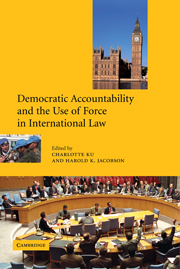Book contents
- Frontmatter
- Contents
- List of figures
- List of tables
- Notes on contributors
- Preface
- List of abbreviations
- I Introduction
- II The domestic and international context
- III Traditional contributors to international military operations
- 6 Canada: committed contributor of ideas and forces, but with growing doubts and problems
- 7 Norway: political consensus and the problem of accountability
- 8 India: democratic, poor, internationalist
- IV Newcomers to international military operations
- V Permanent members of the UN Security Council
- VI Conclusion
- Appendix A. Uses of military forces under the auspices of the UN and NATO
- Appendix B. Country participation in international operations, 1945–2000
- References
- Index
6 - Canada: committed contributor of ideas and forces, but with growing doubts and problems
Published online by Cambridge University Press: 30 July 2009
- Frontmatter
- Contents
- List of figures
- List of tables
- Notes on contributors
- Preface
- List of abbreviations
- I Introduction
- II The domestic and international context
- III Traditional contributors to international military operations
- 6 Canada: committed contributor of ideas and forces, but with growing doubts and problems
- 7 Norway: political consensus and the problem of accountability
- 8 India: democratic, poor, internationalist
- IV Newcomers to international military operations
- V Permanent members of the UN Security Council
- VI Conclusion
- Appendix A. Uses of military forces under the auspices of the UN and NATO
- Appendix B. Country participation in international operations, 1945–2000
- References
- Index
Summary
Introduction
The issues of political, legal, and constitutional accountability in sending Canadian forces into harm's way have come to national attention because of debate about the 1999 NATO Kosovo War. These issues of accountability have to be understood within the context of Canada's parliamentary traditions and long-standing commitment to international peacekeeping and the United Nations. Debates about the forms of authorization and accountability have become increasingly pronounced in recent years.
On the one hand, there is growing concern about the UN's international peace and security role and the general political accountability of the five permanent members (P-5) of the Security Council to the wider membership of the UN. On the other hand, there are important domestic political accountability issues, too. Many parliamentarians, particularly those in opposition, feel that successive governments neither adequately informed parliament nor sought approval from it when Canadian forces have been deployed in peace operations. Ironically, this frustration seems to parallel a trend towards greater – not reduced – levels of consultation and parliamentary debate by the current Liberal government. In the aftermath of the Somalia Inquiry, issues of civilian control of military personnel and operations, as well as civilian responsibility to the military, have been especially salient. Somalia provoked calls for improved systems of accountability within both the military and civilian hierarchies in Canada's defense establishment.
This chapter first discusses the constitutional and legal context of the use of military force by Canada.
- Type
- Chapter
- Information
- Publisher: Cambridge University PressPrint publication year: 2003

